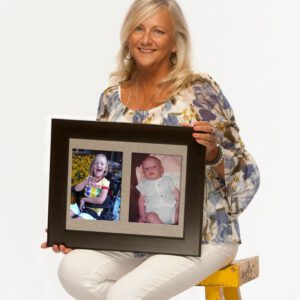
While raising her healthy first child, Philip, Anne Rugari had a second son, Nick, who was diagnosed with Early Infantile Krabbe disease at 7 months of age in 1986. Nick was only a year old when he passed away. Anne knew as she was expecting her third child in 1999, that the baby should be tested at birth for Krabbe. When Gina was born, blood was drawn at birth and the results came back positive for Krabbe disease. Gina began her transplant journey at just three weeks of age receiving an unrelated donor’s umbilical cord blood giving her the missing enzymeA protein needed by the body to break down certain substances by causing a biochemical reaction within the cells. In Krabbe disease, galactocerebrosidase is the deficient enzyme. Words that end in she needed to stabilize the disease. Gina Rugari was a pioneer in the Krabbe world of medicine and research, being the fourth newborn in the world to receive a treatment for this terminal disease. During her lifetime, she couldn’t walk and used a computer to talk, however, Gina was cognitively appropriate at every age. Gina attended public school through her freshman year of high school. She participated in many community activities and had many typical peers as friends. As her disease progressed to her peripheral nervous systemThe nervous system of the body is made up of the Central Nervous System (CNS) and the Peripheral Nervous System (PNS)., Gina lost her battle with Krabbe in the summer of 2015. From Anne’s first hand experiences with a transplanted and untransplanted child, along with the loss of two of her three children, she was inspired to create awareness and educational opportunities about Krabbe disease. One of Anne’s roles at KrabbeConnect is Patient Engagement Manager where she works to support the patients, families, caregivers, and others who have experienced a Krabbe disease diagnosis. She has over 35 years of experience with Krabbe disease and has worked with many clinicians, researchers, and other Krabbe disease stakeholders to help improve treatments and outcomes for patients diagnosed with the disease. She is available to help with newly diagnosed patients, those wanting information about all treatment options, clinical trialA clinical trial is research designed to understand the safety and efficacy of a drug, biologic or device. There are 4 phases to most clinical trials from Phase 1 that seeks to answer safety concern information, and support for those who have had a Krabbe disease diagnosis.


